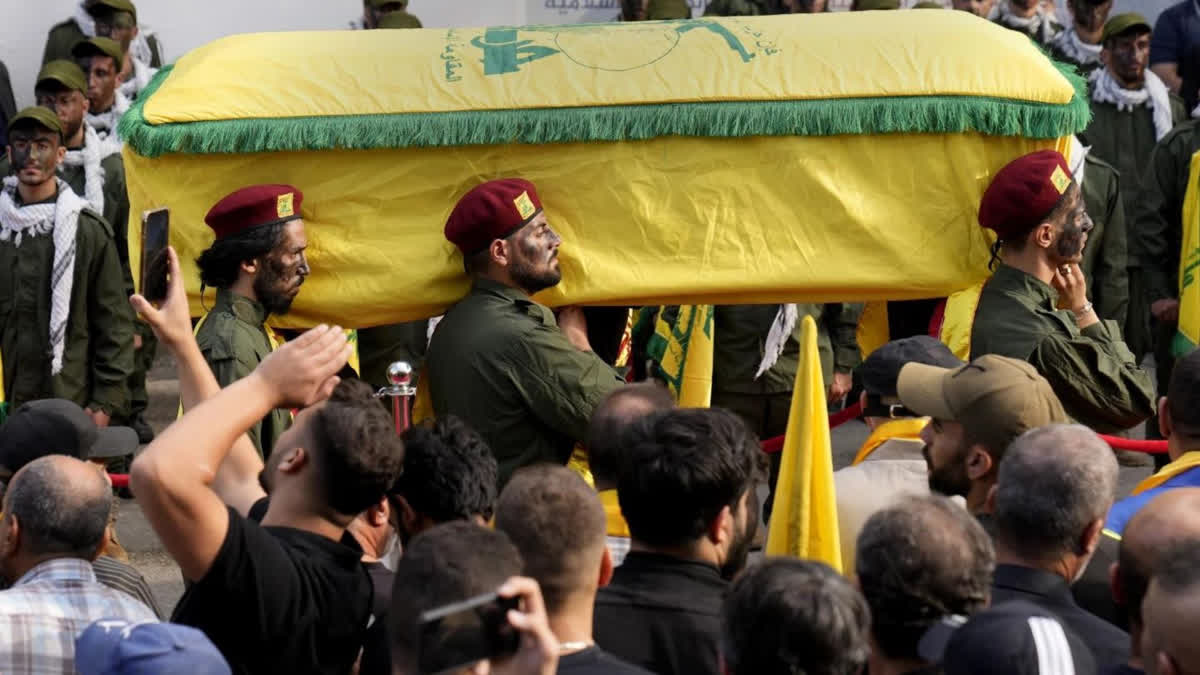Beirut: Will Lebanon's heavily armed Hezbollah militia join the Israel-Hamas war? The answer could well determine the direction of a battle that is bound to reshape the Middle East.
Hezbollah, which like Hamas is supported by Iran, has so far been on the fence about joining the fighting between Israel and the Gaza Strip's Islamic militant rulers. For the past six days, Israel has besieged Gaza and hammered the enclave of 2.3 million Palestinians with hundreds of airstrikes in response to a deadly Hamas attack on southern Israel.
Israel, which has vowed to crush Hamas, is now preparing for a possible ground offensive. While the country's political and military leaders weigh the next move, they are nervously watching Hezbollah on Israel's northern border and have sent troop reinforcements to the area. Hezbollah, with an arsenal of tens of thousands of rockets and missiles capable of hitting virtually anywhere in Israel, is viewed as a far more formidable foe than Hamas.
Israel is anxious that opening a new front in the country's north could change the tide of the war, with Hezbollah's military caliber far superior to that of Hamas. But the fighting could be equally devastating for Hezbollah and Lebanon.
The possibility of a new front in Lebanon also brings back bitter memories of a vicious monthlong war between Hezbollah and Israel in 2006 that ended in a stalemate and a tense detente between the two sides. Lebanon is in the fourth year of a crippling economic crisis and is bitterly divided between Hezbollah and its allies and opponents, paralysing the political system.
Also Read : US Secretary of State Antony Blinken arrives in Israel amid its war on Hamas
Israel is especially worried about Hezbollah's precision-guided missiles, which are believed to be aimed at strategic targets like natural gas rigs and power stations. Hezbollah is also battle-hardened from years of fighting alongside President Bashar Assad's troops in neighboring Syria.
At the same time, Hamas and Hezbollah have grown closer as Hamas leaders have moved to Beirut in recent years. While Hezbollah has largely remained on the sidelines, people close to the group say an Israeli ground offensive could be a possible trigger for it to fully enter the conflict with devastating consequences.
Qassim Qassir, a Lebanese analyst close to the group, said Hezbollah will not allow Hamas' destruction and won't leave Gaza alone to face a ground incursion. When the situation requires further escalation, then Hezbollah will do so, he told The Associated Press. An official with a Lebanese group familiar with the situation, who spoke on condition of anonymity in line with regulations, said Hezbollah fighters have been placed on full alert.
Hezbollah and Israel have targeted military outposts and positions in brief rocket and shelling exchanges on the border since the outbreak of the Gaza war. Three Hezbollah fighters were killed Monday, while Israeli officials said one Israeli soldier was killed in an anti-tank missile attack two days later. Three Israeli soldiers were killed and five were wounded in a skirmish with Palestinian Islamic Jihad militants who crossed the southern Lebanese border into Israel. Hamas also claimed responsibility for firing several rockets into Israel from southern Lebanon.
Anthony Elghossain, a senior analyst with the Washington-based New Lines Institute, said that while neither Israel nor Hezbollah appears to want to enter significant and sustained armed conflict, there is a risk of escalation even without a ground invasion of Gaza if either side makes a miscalculation and oversteps the usual rules of engagement.
With an eye toward Hezbollah, U.S. President Joe Biden has warned other players in the Middle East not to join the conflict, sending American warships to the region and vowing full support for Israel. "He's backed up that warning with the deployment of our largest carrier group, the Gerald R. Ford, as well as again making sure that Israel has what it needs and that we also have appropriate assets in place," Secretary of State Antony Blinken said Thursday during a stop in Israel.
While Hezbollah officials and legislators have threatened escalation, their leader, Hassan Nasrallah, has remained silent since Hamas' surprise weekend attack. The group in its public statements has said that they are continuing to monitor the situation. A spokesperson for Hezbollah did not respond to requests for comment.
An Israeli military spokesman, Lt. Col. Jonathan Conricus, said in a video briefing posted on X, formerly known as Twitter, that the situation is relatively stable on the northern front. We are monitoring the situation so that it doesn't change, he said. We are deployed in significant numbers, strength and capabilities and we are very vigilant to any attempt by Hezbollah to escalate the situation.
A Western diplomat, speaking on condition of anonymity in line with regulations, said international governments have urged Lebanese authorities to keep the crisis-hit country away from a new war. Lebanon's caretaker Prime Minister Najib Mikati called Thursday on all Lebanese groups to exercise self restraint and not to be pulled into Israel's plans," an apparent message to Hezbollah. He said Lebanon condemns criminal acts committed by Israel saying that it is wiping out children and civilians and called on the international community to work on ending hostilities.
Israeli leaders have repeatedly warned that they would unleash vast destruction in southern Lebanon if war breaks out with Lebanon. Israel in 2006 flattened large parts of villages, towns and cities in southern Lebanon and entire blocks in Beirut's southern suburbs. Following the war, Lebanon received an influx of international funding, including from wealthy Gulf countries, for reconstruction.
However, as Hezbollah has gained power, Lebanon's ties with Gulf monarchies have soured and the international community has grown frustrated with rampant corruption and mismanagement. On top of that, Lebanon's government institutions are cash-strapped and dysfunctional. If war were to start now, we would be looking at a much slower and more complicated reconstruction, said Mona Fawaz, a professor of urban studies and planning at the American University of Beirut.
